Love (Along With And Nuts And Balls) Will Bring Us Together ...Deep within the bosom of the French countryside, cradled in the
Dordogne, lies the sleepy village of Abjat sur Bandiat. When I say ‘sleepy’, I mean
‘comatose’.
Should you look for it on a map, it’s marked down as a crossroads, it’s name, almost invisible. Surrounded by 1000’s of square kilometres of green fields, which look out onto farming land which, in turn, look out onto more green fields and yet more farming land. Stereotypically quaint and straight out of a postcard.
A state-of-the-art on-board GPS in the Volvo I was driving couldn’t find it.
Abjat has a population of 700 and the average age is rocketing towards 68 - there aren't many youngsters knocking about. The internet is only available via telephone lines and television is limited to the five terrestrial channels. There is a football stadium, but nothing much happens there (please refer to the average age). On the outskirts of the village, wild boar are plentiful and currently being shot of a Sunday morning by overweight farmers with a penchant for rich meat.
As the young grow up, they leave places like Abjat to seek work in neighbouring cities. The old are left behind and the village begins to die.
Enter the expatriates.
In countries like Holland, Germany and the UK, young couples in their early 30’s are selling up and moving to places like Abjat. Naturally, there’s a large anti-foreigner movement in France as the locals believe that their countryside is being overrun. Earlier this year, a number of towns in Brittany organised an ‘anti-British march’ through shopping precincts to voice their feelings.
The biggest gripe they hold against ‘Johnny foreigner’ is that he buys up property like it’s in the pick ‘n mix section of a sweet shop - and for an inflated price that prohibits any young French couple from getting a look-in. The next on the list is that the new arrivals don’t mix in with the local population and refusing to speak French from day one.
In their defence, European immigrants normally bring children with them, which means that the local schools to remain open (many have closed). Newcomers buy properties from the local French, who themselves, have jacked-up their prices four-fold, therefore knocking their
own youth out of the bidding race - from the moment they put the house on the market.
In Abjat sur Bandiat, all is serene. The English enjoy the French and the French enjoy the English. They get on. Rather well. There are now some 50 British couples who live in the area, a small percentage of whom have been there for 20 years or more, but they all speak fluent French (or at least are learning to a high degree). Their children are perfectly bi-lingual, running around with French kids who are learning English at the same time. Should you take the plunge and move to a village like Abjat, you would hardly expect a 60yr old Limousin farmer to learn to speak plumy English?
They have taken things one step further … serious integration.
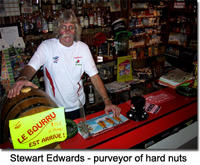 In 1989, British couple Stewart and Sue Edwards, waved goodbye to Greenwich in London, and bought one of two Abjat café/restaurants. They renamed it the ‘Entente Cordiale’ - a tobacconists, newspaper shop, café, restaurant and meeting place for Brits and French alike. If the food is not up to scratch in small provincial restaurants, then failure and a voracious estate agent are not far away. The French love eating at chez Edwards and there’s nothing on the menu that smacks of Blighty. It’s all traditional Perigord food which happens to be cooked by a British cook - Sue.
In 1989, British couple Stewart and Sue Edwards, waved goodbye to Greenwich in London, and bought one of two Abjat café/restaurants. They renamed it the ‘Entente Cordiale’ - a tobacconists, newspaper shop, café, restaurant and meeting place for Brits and French alike. If the food is not up to scratch in small provincial restaurants, then failure and a voracious estate agent are not far away. The French love eating at chez Edwards and there’s nothing on the menu that smacks of Blighty. It’s all traditional Perigord food which happens to be cooked by a British cook - Sue.
British?
“But zee Bree-teesh food eez terr-eeble, non!?” so the French chant goes.
So, why is the restaurant at the ‘Entente Cordiale’ so popular? Neither Stewart or Sue have ever considered forcing their British-ness on the locals. “It's a French bar/restaurant, we’re in France but we happen to be British”, Stewart tells me. “We serve nothing but good local French cuisine. Fresh meat, vegetables and other delights”.
On a sun-bathed Sunday October morning, a steady flow of French locals streamed in through the doors to buy a newspaper, a pack of 20 and have a chat to Stewart and Sue over a cup of coffee - just the same as millions of other French do all over the country, everyday. Stewart took French nationality a few years ago but remains a true Brit. The locals hardly notice his slight accent.
Seizing on an opportunity to push integration a little further, Stewart held a master-class in an ancient British sport - hoping that the French would take to it like a duck to a kitchen grill.
Conkers.

On the Saturday, he’d organised a conker championship in an adjoining village which (wait for it) was won by a Frenchman. Stewart is the President of the
‘La Fédération Française de Conkers’ and organises the French National Team. His hobby has taken over and within the stings of conkers festooned throughout the café, are photos of Stewart and the British pop group Genesis thrashing it out in the dressing room of a music venue - Mike Rutherford clearly in hysterics. Most weekends will see the French and Brits swinging their nuts for all they’re worth. The Brits feel that it’s important to introduce the locals to this strange and odd-ball sport, and the French are more than happy to oblige. As it happens, the 2002 Ladies World Conker Champion was French.
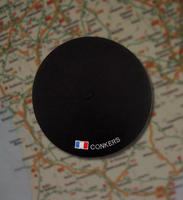
Time for a little exchange as, on Sundays, the French take the Brits on in a game of petanque (boules). Again, organised by Stewart.
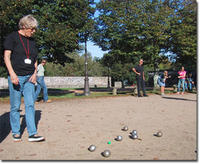
It would seem that integration in this part of France is working. The village has been re-born with new money and new life. Multi-lingual children run safely through the village lanes. Jean-Claude Massiou, the mayor of Abjat sur Bandiat, certainly has no qualms over this foreign invasion. He and his good lady wife, Madame Massiou, hold regular dinner parties for French and British couples
“This village is living proof that integration works” he told me.
Many of today's local octogenarians probably joined the maquis of 1942, to cry havoc against the Nazis and the puppet-government of the day. That's as far as anti-foreign combat went. The word ‘xenophobe’ no longer exists here.
Allabest,
Stu
 “A place to discuss and promote the future of the handicapped person”, says the event flyer …
“A place to discuss and promote the future of the handicapped person”, says the event flyer … Interior Minister, Nicolas Sarkozy, has pledged that ‘hot areas’ will receive regular visits by police in an effort to combat terrorist activity which has been brewing in Muslim communities.
Interior Minister, Nicolas Sarkozy, has pledged that ‘hot areas’ will receive regular visits by police in an effort to combat terrorist activity which has been brewing in Muslim communities.



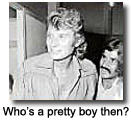

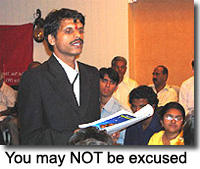


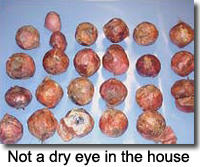


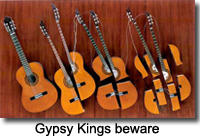
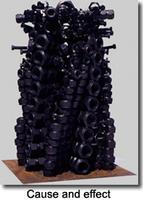










 One has to wonder whether his next assignment will see him take on the World's baddies armed with a homemade packed lunch and a bottle of Dandelion and Burdock ...
One has to wonder whether his next assignment will see him take on the World's baddies armed with a homemade packed lunch and a bottle of Dandelion and Burdock ...


 The musical pair were as charming as their output and I hope that these photographs do them justice. You can find
The musical pair were as charming as their output and I hope that these photographs do them justice. You can find 
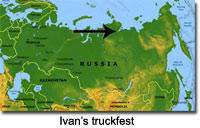 “Oh, we’ve had some funny experiences”, he continued, “on one trip, the snow and ice had seized up the truck so that we were stuck solid. Couldn’t move at all. My mate Dimitri took a rosary out of his pocket and started praying” (sounds a riot Ivan, please, continue) … “once we had all stopped praying, he said to me that if we ever get out of this alive he‘s going to crown himself Pope!”
“Oh, we’ve had some funny experiences”, he continued, “on one trip, the snow and ice had seized up the truck so that we were stuck solid. Couldn’t move at all. My mate Dimitri took a rosary out of his pocket and started praying” (sounds a riot Ivan, please, continue) … “once we had all stopped praying, he said to me that if we ever get out of this alive he‘s going to crown himself Pope!”
 Yes, things were different when we were younger. Manners were in common use and adhered to. People had respect for others. And the youth of today (standby; tirade warning), what are they putting in the water??? You can’t fail to miss large, bulging adolescents in ill-fitting clothing. Especially the female variety on a nice sunny day, with a large roll of German-style beer belly flopping over the top of their jeans. And the male population could do something to sharpen their appearance too; jeans hanging down to their knees, revealing the band of some designer underwear.
Yes, things were different when we were younger. Manners were in common use and adhered to. People had respect for others. And the youth of today (standby; tirade warning), what are they putting in the water??? You can’t fail to miss large, bulging adolescents in ill-fitting clothing. Especially the female variety on a nice sunny day, with a large roll of German-style beer belly flopping over the top of their jeans. And the male population could do something to sharpen their appearance too; jeans hanging down to their knees, revealing the band of some designer underwear.